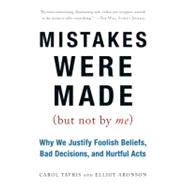
Note: Supplemental materials are not guaranteed with Rental or Used book purchases.
Purchase Benefits
What is included with this book?
| Introduction: Knaves, Fools, Villains, and Hypocrites: How Do They Live with Themselves? | p. 1 |
| Cognitive Dissonance: The Engine of Self-justification | p. 11 |
| Pride and Prejudice ... and Other Blind Spots | p. 40 |
| Memory, the Self-justifying Historian | p. 68 |
| Good Intentions, Bad Science: The Closed Loop of Clinical Judgment | p. 97 |
| Law and Disorder | p. 127 |
| Love's Assassin: Self-justification in Marriage | p. 158 |
| Wounds, Rifts, and Wars | p. 185 |
| Letting Go and Owning Up | p. 213 |
| Afterword | p. 237 |
| Endnotes | p. 239 |
| Index | p. 277 |
| Table of Contents provided by Ingram. All Rights Reserved. |
The New copy of this book will include any supplemental materials advertised. Please check the title of the book to determine if it should include any access cards, study guides, lab manuals, CDs, etc.
The Used, Rental and eBook copies of this book are not guaranteed to include any supplemental materials. Typically, only the book itself is included. This is true even if the title states it includes any access cards, study guides, lab manuals, CDs, etc.
Excerpted from Mistakes Were Made (but Not by Me): Why We Justify Foolish Beliefs, Bad Decisions, and Hurtful Acts by Carol Tavris, Elliot Aronson
All rights reserved by the original copyright owners. Excerpts are provided for display purposes only and may not be reproduced, reprinted or distributed without the written permission of the publisher.